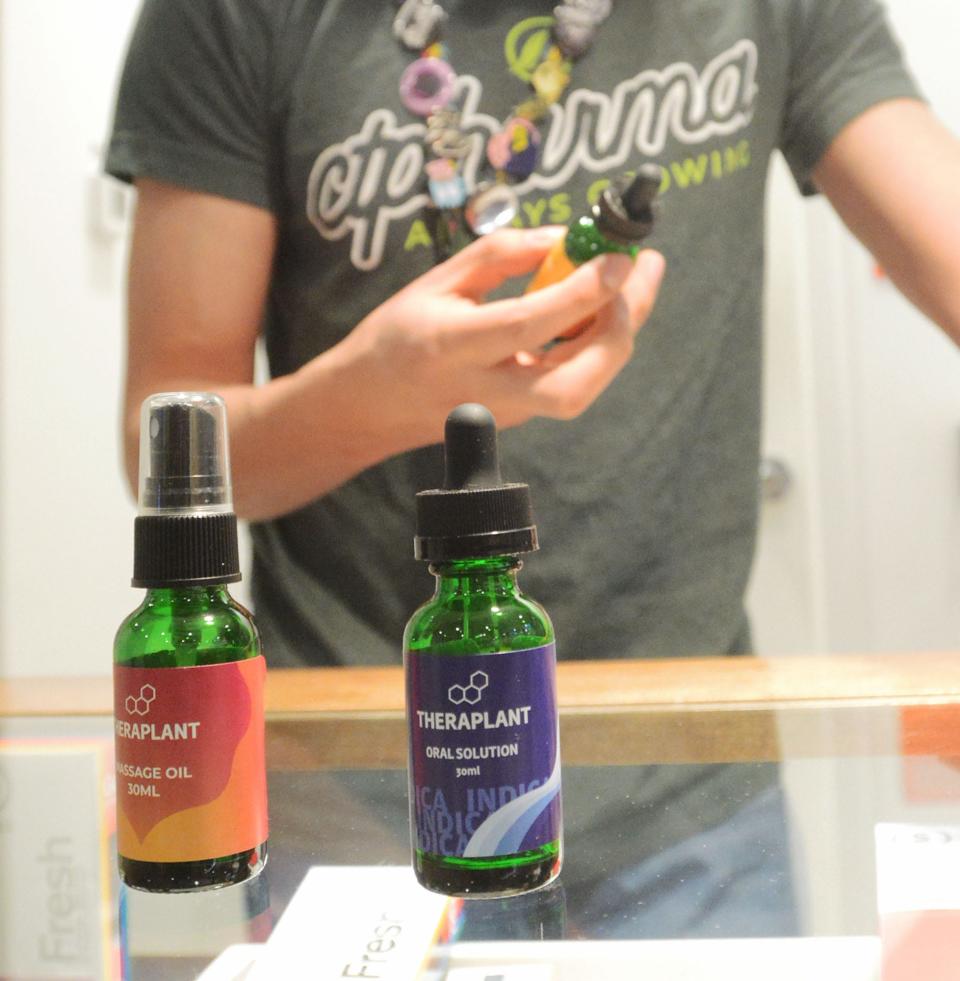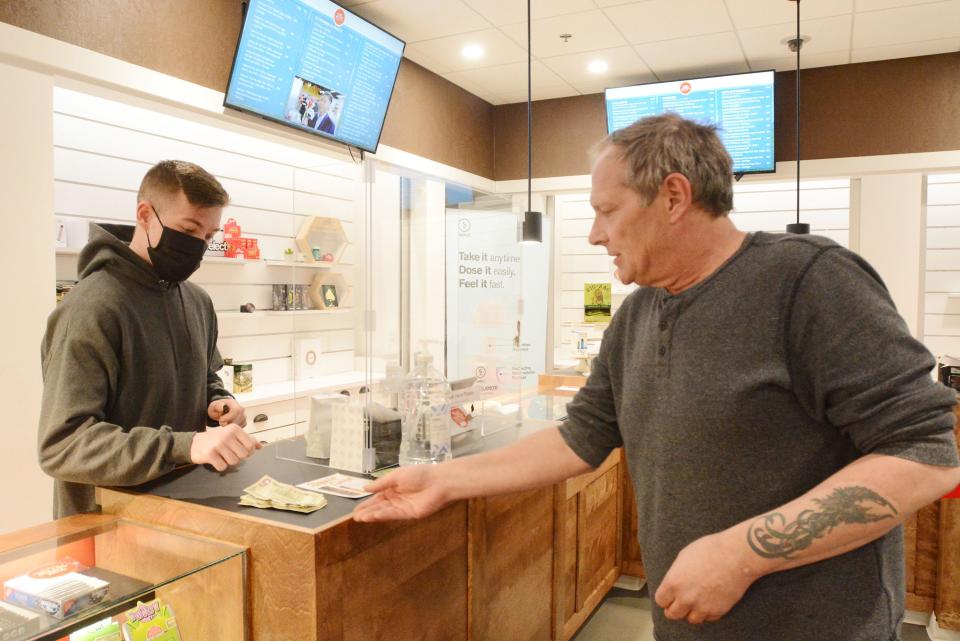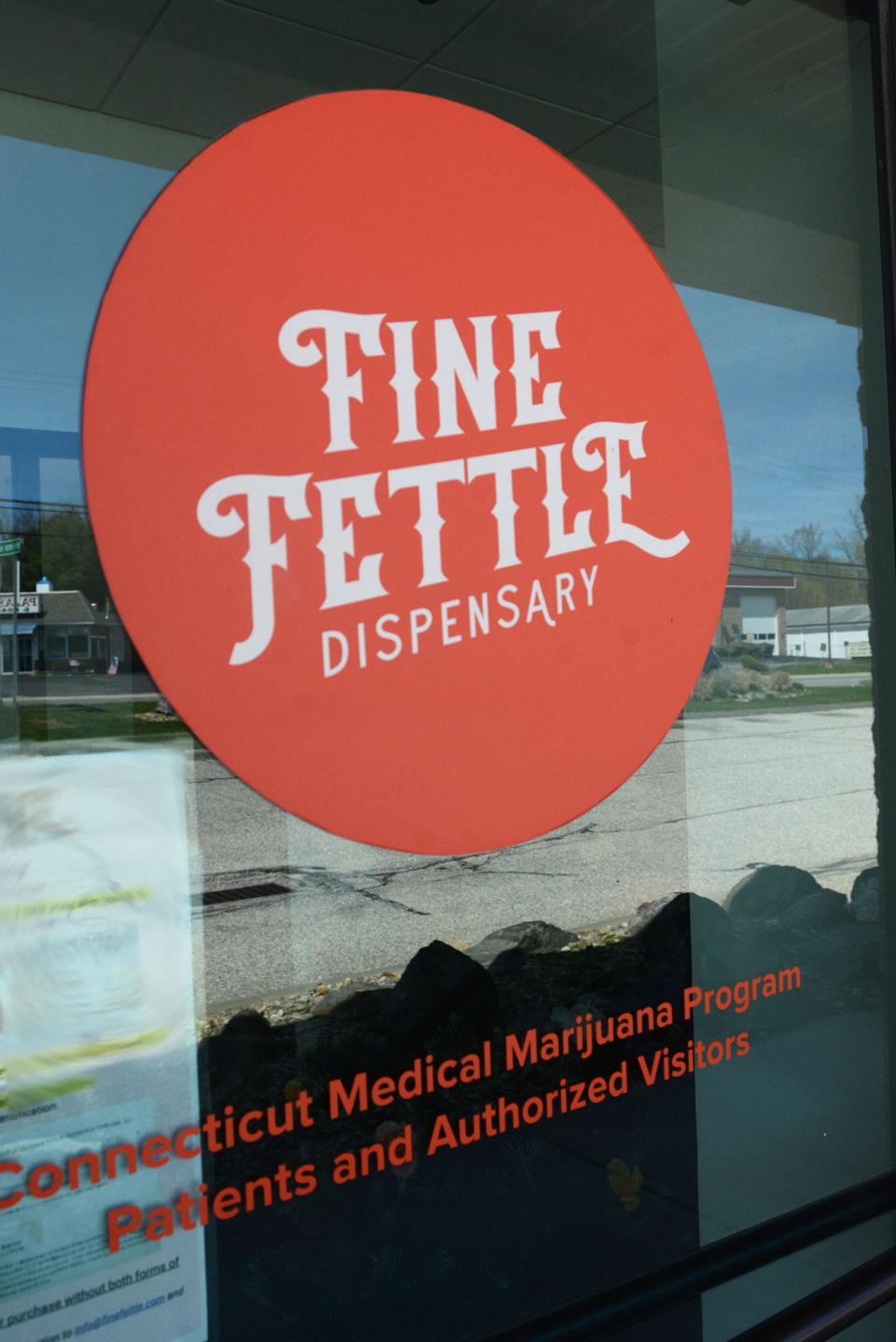It's the first 4/20 since CT legalized adult-use cannabis. Where does the industry stand?
WILLIMANTIC — As an adult-use cannabis industry draws closer to being a reality in Connecticut, Benjamin Zacks, chief operating officer of medical marijuana dispensary Fine Fettle, said the business and social impact is too big to ignore.
“People are going to see that this is an enormous social, equitable economic opportunity for Connecticut that doesn’t come around very often,” Zacks said.
Connecticut legalized adult-use, recreational marijuana last summer, and businesses wanting to enter the new market are raring to go. The state, however, doesn’t expect legal businesses to start until the end of the year, given the process for granting licenses.

“It’ll take time for people to secure a location, and people don’t want to do that until they know they have a license,” Kaitlyn Krasselt, communications director of the Connecticut Department of Consumer Protection, said.
Adult-use marijuana: Adult-use marijuana sales will begin in CT this year. What does that look like in Norwich?
Zacks said Fine Fettle’s three Connecticut medical dispensaries, including one in Willimantic, are getting ready for recreational sales, with few things left to do beyond waiting to get awarded a license.
“We think our ducks are in a row and we’re ready to go,” Zacks said.
Marijuana businesses in Norwich
Jason Webski, the CEO of Sweetspot Farms, LLC, said he’s interested, alongside his social equity business partner, to open a growing facility in Norwich, once they get a license from the state.
“In terms of investing in these facilities, we’re going to be pumping $10 million to $15 million into Norwich,” Webski said. “That’s not just investing in the real estate; that’s local contractors. It stimulates the economy in many ancillary ways.”
Cannabis in Norwich: 'Important for the industry.' Norwich aims to make cannabis businesses feel more welcome.
Webski said Norwich has supported the cannabis industry, from entities including the Norwich Community Development Corporation and Norwich Public Utilities, to the city taking the time to learn about the industry.
“There’s certain towns we work with that are much more adversarial,” Webski said. “Norwich, as a town, has done a lot of research and learning on the industry, and it’s been very easy to work with them.”

Most recently, Norwich clarified zoning definitions to include “plant-based” businesses. Kevin Brown, Norwich Community Development Corporation president, said this ordinance has been helpful with the cannabis industry finding real estate.
“It’s a real possibility; there’s no guesswork involved anymore,” Brown said.
Alongside growing the grand list, and a 3% cut from retail, Norwich Mayor Peter Nystrom emphasized the increased business for Norwich Public Utilities, which results in a 10% revenue cut for the city.
High school musical: He plays Daddy Warbucks in NFA's 'Annie.' How he raised money for a CT cancer hospital.
“The growth in this plus (Solar Seal) will use more power than what was lost through energy-saving programs and the closure of the copper plant,” Nystrom said. “That’s a lot of megawatts, and more revenue to the city.”
Zacks said that everyone is still in a process of figuring out how the legal cannabis industry will work in Connecticut. Being 10 months out from legalization, and there already being 18 medical dispensaries and four cultivators in the state, Connecticut already has good infrastructure for the industry.
Tackling social inequity
Webski said that the cannabis business in Connecticut has been “innovative,” saying that Connecticut selling cultivation licenses to fund social equity measures helps eliminate some of the barrier to social equity.
“I think this will be a road map for states to follow,” Webski said.
Norwich Free Academy softball: Could NFA's softball team make a run at the ECC with young players and a first-year coach?
Zacks reiterated that cannabis businesses are capital intensive and many people aren’t going to be able to access the loans needed for the industry, as cannabis is still federally illegal. Zacks said tax revenue from sales should be what funds the loans the state can offer to these businesses.
So far, $10 million in state funds have been approved as loans for social equity applicants. However, Zacks said this money won’t go far, as he estimates that it would cost $2 million just for the business costs.

“There needs to be more money available to see the access and opportunity come to fruition, and not just be an idea,” Zacks said.
When to apply for cannabis licenses
The application window for eight types of cannabis licenses are for 90-day periods, with the first of the 90-day periods closing in May. Krasselt said that people have been responsive to the application requests so far, but said there has been far more demand for cultivation and retail licenses than other types, like cannabis food and beverage manufacturer, or cannabis transporter.
CT rent: Norwich has double the state-mandated affordable housing. Why can't people afford rent?
Krasselt pointed out that there are only two license types for the medical marijuana industry in Connecticut, but the recreational cannabis industry has more, “to have more opportunity to have a business in this industry.”
“There are a lot, and slowly but surely, people are applying for that license type,” Krasselt said.
Webski, from an operator’s perspective, believes the reason why certain license types may not be as attractive as retail and cultivation is because a lot of people who want to get into the business are drawn to the plant itself.
Housing quality: 'Not up to standard:' Norwich's housing quality problems tied to aging properties
“The transportation side, if we’re using that example, in many ways, is no different that transporting cash for banks, or sensitive products for a jewelry company,” Webski said.
However, Brown believes that there are opportunities in the other licensing categories, including for the social equity side of things.

In Public Act No. 21-1, social equity applicants for a growing or dispensing license must be an individual, or apply for a company made up of 65% individuals who, among other criteria, must have lived in an area disproportionately impacted by the War on Drugs for five years, or was from a disproportionately impacted area for nine of their first 18 years of life.
COVID-19 vaccine: Second COVID-19 boosters are now available. Where can you get the shot in Eastern CT?
Otherwise, the social equity applicants go through the same requirements as other growing and retail license candidates, but the allocations for the license lotteries is split evenly between the two sides.
The future of marijuana in CT
Looking into the future, Webski wants to get into hybrid retail, selling both medicinal and recreational cannabis.
In abstract, Webski said cannabis still has “a blue-collar feel,” as many other new industries these days are white-collar oriented, and provides more job opportunities for people, alongside the tax revenue.
Norwich taxes: What's the proposed tax increase for Norwich residents?
Once licenses are given out through the lottery and cannabis businesses are ready to open, Brown is expecting the city to have one or two cultivators, and the one retail establishment as allowed. Brown would want the city to have another retailer or two, but said the city can’t under the current population size guidelines for cannabis licensing, which is one per 25,000 people, to Norwich’s 39,260.
“Limiting us to just one doesn’t really help us get after this matter of social equity, achieve all that is possible,” Brown said.
Zacks is estimating the industry will generate $75 million to $100 million in tax revenue annually and create 3,000 jobs statewide. He’s also expecting a change in public opinion on the cannabis industry.
Killingly Board of Education: Here's why some say the fate of Killingly school board investigation hinges on next steps
“That’s a very meaningful, real impact,” Zacks said.
However, Nystrom is still unsure how long Connecticut’s lead will last, as he believes federal legalization is only a matter of time, noting that the U.S. House vote passed federal marijuana decriminalization on April 1.
“This is a great financial gain, but it could be short term,” Nystrom said. “We hope it’s not.”
This article originally appeared on The Bulletin: Where does CT's pot industry stand for its first fully legal 420?

